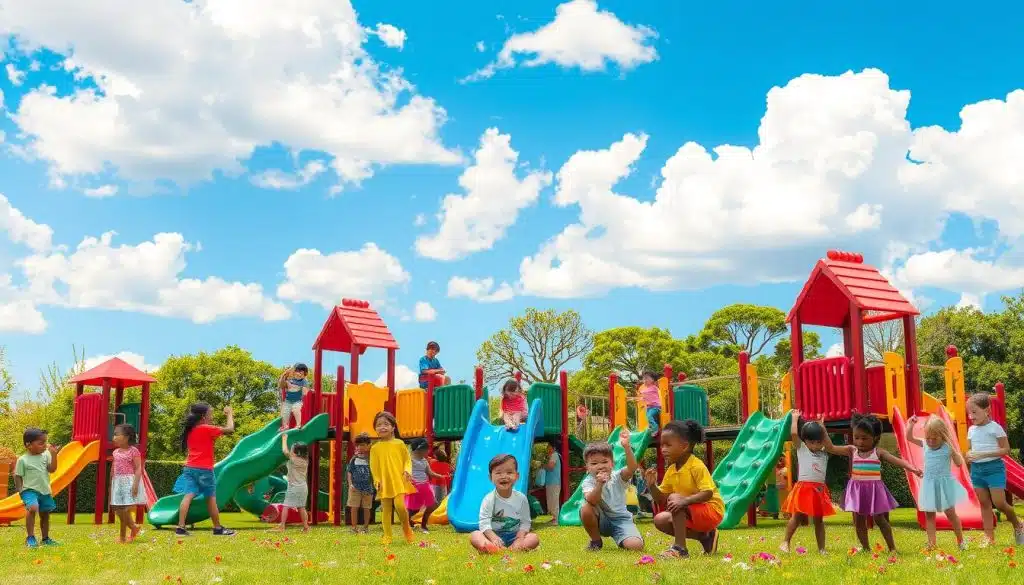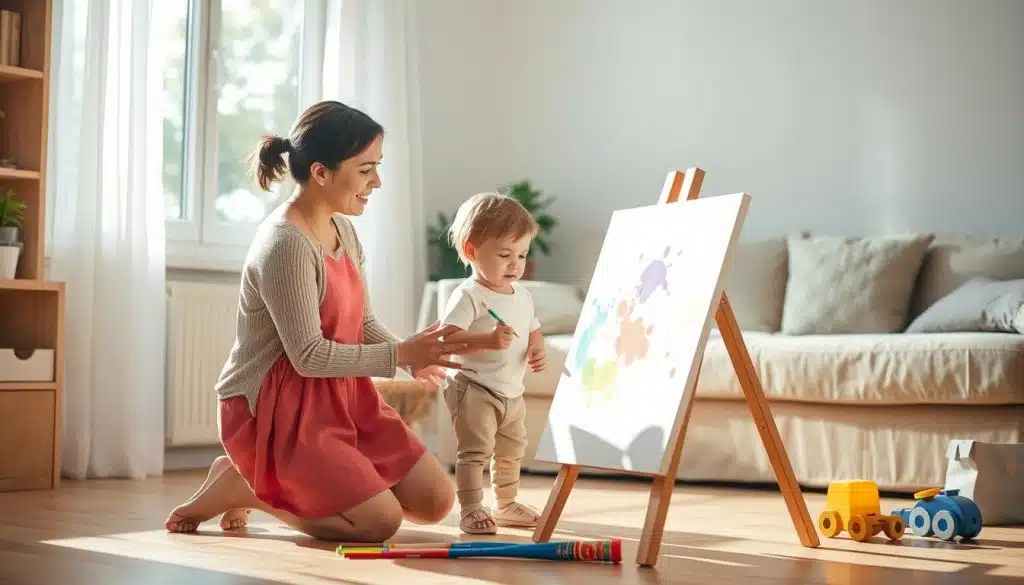As a parent, you’ve seen a young child’s endless energy and creativity. They love to explore and test their limits. This is Erik Erikson’s third stage of psychosocial development, known as Initiative vs. Guilt. It’s a time when kids learn to balance being independent with the rules of their world.
Imagine a young child, Emma, who loves building forts. She’s excited to be in charge of her own castle. This shows the initiative Erikson talks about, where kids take action and feel important.
But when Emma tries to tell her sibling how to build, her parents might step in. They might change the design or move the cushions. This can make Emma feel guilty about her ideas and decisions.
Erikson’s initiative vs. guilt stage is key in psychosocial growth, happening between 3 and 6 years old. Kids start to show their power through play and social actions. They want to explore and take the lead, but also feel guilty if they fail or go too far.
This stage is in the preschool years, a time of big growth. Kids are curious, imaginative, and want to be independent. They love to try new things and show their will, starting to build the basic virtue of purpose.
The main challenge is for kids to feel initiative without fear of failure. Those who succeed learn to know their limits and balance ambition with self-confidence. If they fail, they might feel guilty and shy away from new experiences.
The virtue that grows in this stage is purpose. Kids who take the lead become eager to discover and face new challenges. This builds a strong, purposeful, and confident personality later on.
Erikson’s theory says the initiative vs. guilt stage is key for kids’ growth. It happens when kids are 3-6 years old. During this time, they start to plan, do tasks, and face new challenges. Initiative means being free to start new things, like in a society’s economy.
Kids at this stage love to try new things, play with friends, and use their skills. They learn they can control themselves and their world. But, guilt happens when they fail or feel shy trying something new. It’s important to find a good balance between being bold and feeling guilty.
| Initiative | Guilt |
|---|---|
| Enthusiasm to try new tasks | Shame from failing or feeling embarrassed |
| Joining or creating activities with friends | Reluctance to attempt new things |
| Applying new skills through play | Inability to exert control over environment |
When kids are allowed to explore and take the lead, they feel purpose and confidence. But, too much guilt or strict rules can stop them from starting things or setting boundaries. This can lead to problems like not starting actions, needing too much control, and trouble with friends.
“A healthy balance between initiative and guilt is crucial for successful development during this stage.”
Knowing about Erikson’s initiative vs. guilt stage helps parents and teachers. They can make a space where kids can be curious, solve problems, and find their purpose. This helps them move on to the next stage of growing up.
Play and imagination are key during the initiative vs. guilt stage. This stage, from ages 3 to 5, sees kids wanting to be more independent. Giving them freedom to play boosts their excitement about using their growing skills.
Kids do many types of play at this time. They play physically, like running and climbing, and imagine, like in role-playing. These activities help them solve problems and feel competent.
Independent play is very important here. It lets kids explore, develop ambition, and find their path. Through play, they learn to decide, face challenges, and feel proud of what they do. This is how they build competence.
Play also helps kids work together. They plan, do tasks, and solve problems with friends. This builds leadership, purpose, and teamwork skills.
Caregivers should support exploration and choice-making. This helps kids take initiative and avoid too much guilt during this important time.

During the preschool years, between ages 3 and 5, parents and caregivers play a key role. Kids start to show their power and control through play and social interactions. This is a critical time.
Caregivers who encourage and offer opportunities are vital. They help kids find a balance between taking the lead and feeling guilty. Kids should be free to explore and try new things without fear of failure. Adults who discourage or dismiss kids can make them feel ashamed and overly dependent.
This stage can be tough for adults as kids want more control. But it’s important to find a balance between guiding and giving independence. By understanding Erickson’s initiative vs. guilt phase, caregivers can support healthy growth and ambition in children.

“Successful completion of each stage results in a healthy personality and the acquisition of basic virtues. Failure to complete a stage can result in a more unhealthy personality and sense of self.”
By being patient, encouraging, and focusing on resilience, caregivers can help kids build confidence and independence. This is crucial for their success in later stages of Erikson’s psychosocial development model.
In the delicate interplay of childhood development, the concept of initiative versus guilt plays a pivotal role in shaping a child’s sense of self and moral compass. An example of initiative vs guilt can be illustrated when a child decides to organize a small playdate or create an art project. The joy derived from executing their plan fosters a sense of accomplishment and pride, promoting healthy self-esteem and independence. However, when the same child encounters disapproval from parents or caregivers during these creative endeavors, feelings of guilt may surface, leading them to question their actions and abilities.
Initiative vs guilt examples can be found in everyday situations, from the simple act of a child wanting to help cook dinner to organizing games for friends. These moments can either be empowering or discouraging, heavily influenced by parental reactions. Parental roles play a crucial part in navigating this complex emotional landscape. Supportive and understanding parents can cultivate initiative by encouraging their children’s desires to take charge and pursue their ideas.
The third stage of erikson initiative vs guilt in psychosocial development is key for kids aged 3 to 6. It’s when they start to be independent, explore, and find their ego identity. But, this stage also brings challenges that can shape their future.
The balance between initiative and guilt in this stage shapes a person’s personality and life approach. Kids who develop initiative become confident and ambitious adults. Those with more guilt may struggle with self-doubt and fear, affecting their growth.
“The initiative vs guilt stage is a crucial turning point in a child’s development, where they learn to balance their sense of purpose and autonomy with the need to follow rules and avoid mistakes.”
Erik Erikson’s initiative vs. guilt stage is key in a child’s psychosocial development. It happens between ages 3 and 5. During this time, kids learn to balance wanting to do things on their own and feeling guilty about it.
Parents play a big role in helping kids feel good about trying new things. They also help kids deal with feelings of guilt. This is very important for their growth.
When kids get through this stage well, they become more confident and ready to lead. This stage is crucial for their future. Helping kids during this time can greatly improve their mental and social health.
By understanding and supporting kids during this stage, we help them grow up to be strong and positive. They will be ready to make a difference in the world.